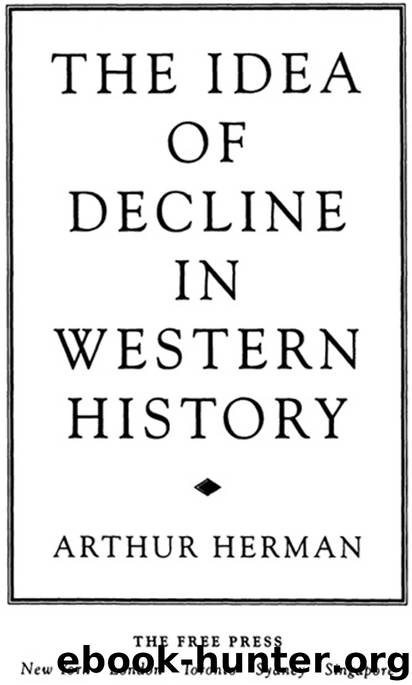The Idea of Decline in Western History by Arthur Herman

Author:Arthur Herman
Language: eng
Format: epub
Tags: SOC035000
Publisher: Free Press
Published: 1997-02-26T16:00:00+00:00
THE HOLLOW MEN: ARNOLD TOYNBEE’S LOST GENERATION
By birth and education, Arnold Toynbee, Jr., was a sterling product of the New Liberalism. His college at Oxford, Balliol—which he entered in 1907—was its epicenter. Balliol’s famous master, Benjamin Jowett, had brought Thomas Hill Green there in 1874 to help breed an elite “aristocracy of talent” that would carry out the postliberal agenda (in fact, Jowett’s Balliol was the direct model for the Harvard of Charles W. Eliot and Henry Adams). Toynbee’s uncle, Arnold Senior, had been tutor and bursar at Balliol. Its distinguished alumni included not only leading liberal intellectuals like Bernard Bosanquet and L.T. Hobhouse, but the chancellor of the exchequer as well as the foreign secretary, a former viceroy of India, and Lord Milner, the principal architect of British policy in South Africa. Graduating in 1911 with first-class honors, the brilliant young Toynbee immediately won a position at Balliol as tutor in Greek history and married the daughter of the most respected classical scholar of the age, Gilbert Murray. His future, like that of Britain itself, seemed assured.
“It was assumed as a matter of course,” he wrote half a century later, “that the framework of the coming world-order would be the Western civilization…. Other civilizations had risen and fallen, had come and gone, but Westerners did not doubt that their own civilization was invulnerable.”25
This brittle confidence of Toynbee and his generation was shattered by the coming of war in 1914. In terms of sheer numbers—702,410 dead—Great Britain suffered no more in World War I than Italy. But Britain’s casualties were disproportionately drawn from society’s elite: one third of the Oxford class of 1913 died in the war, and the death of many promising young Balliol men cast a pall over the British establishment. Out of the shock and sense of loss would emerge the myth of the “lost generation,” which haunted British intellectual culture and policy-making for the next two decades.26
World War I was for Great Britain what Vietnam would be for America, the breaking of the morale of its political elite. As a character in an Aldous Huxley novel remarked, “The bottom has been knocked out of everything.”
Among those broken was Arnold Toynbee. “My illusion that I was the privileged citizen of a stable world,” he wrote afterwards, “had been shattered,” and he would view neither his own society nor the West in the same light again.27 Yet Toynbee managed to escape the ordeal unscathed. Although he initially supported “the war for civilization,” his mother’s encouragement and the help of influential family friends enabled Toynbee to evade service with a trumped up medical deferment. While fellow collegians were fighting and dying in Flanders and Salonika, Toynbee remained safe at Balliol, discussing Hellenistic history with his students over tea and sherry and writing a pamphlet calling for a negotiated peace.*28 Guilt over his compromised position plagued Toynbee for the rest of his life. Almost as if in reaction, he became a committed pacifist who detested everything smacking of military valor, heroism, patriotism, or other “antiquated” notions of the prewar Victorian past.
Download
This site does not store any files on its server. We only index and link to content provided by other sites. Please contact the content providers to delete copyright contents if any and email us, we'll remove relevant links or contents immediately.
| Anthropology | Archaeology |
| Philosophy | Politics & Government |
| Social Sciences | Sociology |
| Women's Studies |
The remains of the day by Kazuo Ishiguro(8969)
Tools of Titans by Timothy Ferriss(8363)
Giovanni's Room by James Baldwin(7325)
The Black Swan by Nassim Nicholas Taleb(7106)
Inner Engineering: A Yogi's Guide to Joy by Sadhguru(6785)
The Way of Zen by Alan W. Watts(6600)
Asking the Right Questions: A Guide to Critical Thinking by M. Neil Browne & Stuart M. Keeley(5757)
The Power of Now: A Guide to Spiritual Enlightenment by Eckhart Tolle(5748)
The Six Wives Of Henry VIII (WOMEN IN HISTORY) by Fraser Antonia(5496)
Astrophysics for People in a Hurry by Neil DeGrasse Tyson(5182)
Housekeeping by Marilynne Robinson(4436)
12 Rules for Life by Jordan B. Peterson(4299)
Double Down (Diary of a Wimpy Kid Book 11) by Jeff Kinney(4261)
Ikigai by Héctor García & Francesc Miralles(4246)
The Ethical Slut by Janet W. Hardy(4242)
Skin in the Game by Nassim Nicholas Taleb(4237)
The Art of Happiness by The Dalai Lama(4125)
Skin in the Game: Hidden Asymmetries in Daily Life by Nassim Nicholas Taleb(3987)
Walking by Henry David Thoreau(3952)
